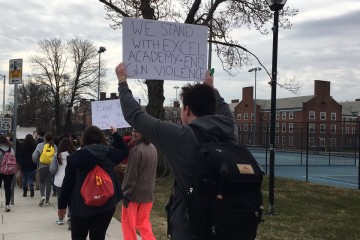Letter to the Editor: “Good Hair”
This Letter to the Editor was submitted by Johana Gourdin.
Walk down the beauty aisle of any Target, Walmart, or grocer and you’ll see a multitude of products featuring white women with hair blowing in the wind. Too bad I’m black with naturally kinky coily hair. Let me explain, black hair comes in all shapes and sizes from long dark ringlets to seemingly short ‘S’ curls. Our hair is curly or nappy, but it can be chemically processed to fall flat and straight. This process is called ‘perming’ and for a while most black women had permed hair. But recently there has been a move to reclaim natural ethnic pride and diverge from European standards of beauty. It’s dumb to strive to achieve a type of hair we black women will never have. Caucasian hair is different from ours; it produces its own oil, that’s why if white people don’t wash their hair for a few days it gets greasy. Conversely, black hair doesn’t produce all the oils it needs so we have to add them with products. I am natural, if you were to draw my curls, you’d scribble in tight tiny spirals til your page was covered in a dense dark mesh of black. My beauty needs do not include ‘volumizing shampoo’, ‘clear firm hold spray’, or ‘texturizing powder’. When hair products are put in shop windows, the displays are remarkably white washed. In most stores, the necessities for my hair: leave-in deep conditioners, creamy oil moisturizers, and sulfate and alcohol free clarifying shampoos are left off the shelves. Even worse many salons have ill equipped ‘cosmetologists’ who “don’t know how to handle my hair”. When I decided I’d go to Frostburg I had a daunting task ahead of me, figuring out how to manage my curly locks without the aid of a professional. So I brought my own clippers, taught myself how to cut hair, and bought my hair products in bulk. If I couldn’t depend on my ‘muiti-cultural’ salons back in Baltimore to provide me with adequate assistance, I damn sure wasn’t going to bank on Frostburg having it! I expected that the most I’d find at the Walmart near campus was maybe a leave in conditioner, or Moroccan oil. To my surprise, they actually had an armful of products, which is more than nothing. But to put it into context, imagine a world where you can only wear flip flops. Not because there is a shortage of shoes but because your local mall, mom and pop shop, and department store don’t carry any other shoes in your size. Remember its cold in Frostburg, so every day you see people rocking their varieties of Timberlands, Ugg boots, and fur lined loafers, while your toes freeze off. Welcome to the life of a natural black person, not only is it inconvenient for us to use the bare minimum of necessities for our hair, but it’s downright unhealthy. Even worse than the lack of products, is the lack of information on black hair. Many people don’t learn about how to care for their kinky hair, until it’s too late. They learn after damaging their hair with products meant for Caucasian hair. I cannot tell you how many black boys I see on campuses that DO NOT take care of their hair. But I don’t blame them, all they see in the media for men’s hair is white 3 in1 shampoos that clean your hair, body and lather for a good after shave. That is death for anyone’s hair, but the drying alcohols are extremely detrimental to thirsty hair in need of hydration. The few products that are out there for natural hair are intensely gendered. I mean what guy in our feminine fearing society what’s to smell like coconut and hibiscus, or boast about using Dark and Lovely moisturizing soufflé. Good hair etiquette is not just for women and access to proper resources shouldn’t just be a white privilege. Having natural hair isn’t exclusive to black women; in fact most black men are natural. For a society so obsessed with attractiveness, we sure have a fickle way of achieving it. Everyone deserves a chance of attaining their idea of beautiful healthy hair, not just those with ‘good hair’.




1 Comment